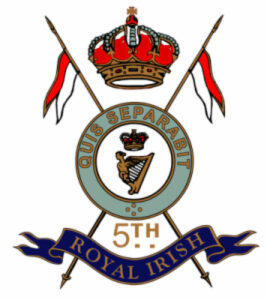
Logo, 5th Royal Irish Lancers
Source: RoyalLancers.org
William Charles Lord F.R.P.S. M.R.C.V.S. (1823 – 1874) was an Irish-born orthodox veterinary surgeon who converted to homeopathy to become the first practitioner of homeopathy in the British army.
William C. Lord was a contemporary of veterinary homeopaths William Haycock and James Moore. In January 1865, the British Journal of Homoeopathy published a letter from Lord to Haycock, in which he described an epidemic among the horses at the cavalry barracks, and his successful treatment of the outbreak using homeopathic remedies. The most effective of these, Lord noted, were Nux Vomica, Belladonna, and Aconite.
William Charles Lord was the son of the Reverend John Lord (1780 – 1833), the Rector of Mitchelstown, County Cork and Charlotte Matilda Peard (b. 1786). His grandfather was Cork surgeon John Lord (1750 – 1781).
W. C. Lord studied at Edinburgh Veterinary College, founded in 1819 by Professor William Dick, and won the first medal of the 1841-2 session. A fellow student at College at the same time was future veterinary homeopath, William Haycock.
Lord obtained a commission in the British army, and served for more than 27 years. In 1846, he succeeded John Wilkinson as Veterinary Surgeon of the Duke of Cambridge‘s Own 17th Lancers. This regiment would arguably become most famous for its participation in the Charge of the Light Brigade during the Crimean War.
In August 1850, Lord married Caroline Victoria Corker (1827 – 1859) in Tunbridge Wells. They had two sons John Charles William Lord (1851 – 1869) and Reginald Percival Lord (1853 – c.1881).
Lord was transferred to the 14th Dragoons in October 1852, and joined the regiment in India. Whilst there he was initiated as a Freemason into the Hope Lodge (#596) in Meerut, Uttar Pradesh, in November 1853.
In 1858, Lord transferred again, as Veterinary Surgeon to the 5th Light Dragoons. In the aftermath of the Indian Mutiny, this previously disbanded regiment was reformed in Ireland, and re-designated as the 5th Royal Irish Lancers.
Around this time, however, Lord contracted dysentery, and was forced to return to England. In June 1862, Lord was transferred to the cavalry staff, based at the Cavalry Barracks, Canterbury.
No orthodox medical treatment could alleviate Lord’s sickness. In desperation, he turned to homeopathy and was attended by Charles Caulfield Tuckey, then practicing in Canterbury. Very quickly, the dysentery was contained, and Lord’s health improved.
Impressed by his personal experience with homeopathy, Lord began a series of experiments on the horses under his care at the Cavalry Depot. From 1864, the Principal Army Veterinary Surgeon approved Lord’s request for remedies at the government’s expense. For the next eleven years, Lord treated army horses homeopathically, frequently sending reports to the Principal Army Veterinary Surgeon that were reprinted in the pages of the British/Monthly Homoeopathic Review.
In April 1863, William Charles Lord married Louisa Elizabeth Edgar (1847 – 1924), daughter of Norwich surgeon Henry Robert Edgar (1804 – 1853). They had a daughter, Louisa Beatrice Lord (b. 1864)
In 1865, Lord put forward the modern theory of viral transmission of disease as we know it today, although he used the word ‘protozoa’ instead of ‘virus.’
In 1869, Lord retired on half pay as Vice-Veterinary Surgeon of the First Class with the 9th Lancers. He set up in private practice as veterinary surgeon with special expertise in equine diseases at White Horse Street, Piccadilly, London, rapidly building a large and influential circle of clients.
W. C. Lord began, and nearly completed, a treatise on veterinary surgery that, unfortunately, was unfinished at the time of his death. He also submitted cases and articles to various homeopathic publications, including “Distemper in Dogs.”
Around 1871, Lord’s intestinal disease returned, accompanied by rectal cancer. William Charles Lord died in his Kensington home on 25 June 1874, aged 51. He was buried in Brompton Cemetery.
His Obituary was in the September 1874 British Homeopathic Review, and concluded:
Mr. Lord was a kind hearted, generous man, thoroughly devoted to his profession, and ever earnest in pressing on all around him, the value of homoeopathy in the treatment of all forms of disease, whether human or equine.
Select Publications:
- Gastritis Mucosa: or, the Present Epidemic Among Horses, Commonly Called Influenza, Epidemic Catarrh, Distemper (1865)
- Five Years Practical Investigation of Homoeopathy at the Cavalry Depôt and HM Riding Establishment (1869)
Of interest:
Reginald Percival Lord M.R.C.V.S.L. (24 November 1853 – c.1881), son of William Charles Lord, was also a homeopathic veterinary Surgeon. He was born at Chr. Meerut Bengal India in 1853. He wrote The Veterinary Vade Mecum: A Manual on the Horse, Cow, Dog & Sheep; Their Diseases, Homeopathic Treatment, & General Management (1875). The following year, R. P. Lord was the subject of a letter by a Captain Gregg accusing him of fraudulent conduct that was read at a special council meeting of the RCVS. R. P. Lord moved to Baltimore, Maryland, around 1880, and died there the following year.
Percival Barton Lord M.B. (1807 – 1840), older brother of William Charles Lord, was an orthodox surgeon and political officer with the East India Company. He was killed at the Battle of Purwandurrah in November 1840, during the 1st Afghan War.



Leave A Comment